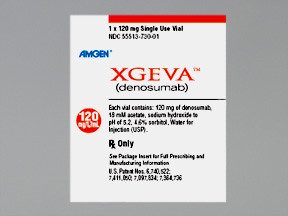DENOSUMAB 4 WEEK (120 MG) - INJECTION
PHONETIC PRONUNCIATION: (den-OH-sue-mab)
COMMON BRAND NAME(S): Xgeva
GENERIC NAME(S): denosumab
Uses
USES: Denosumab is used to treat bone problems that may occur in people with multiple myeloma or in people with cancer that has spread to the bones. It is also used to treat high blood calcium levels (hypercalcemia) that may occur with cancer. It may also be used by adults (and teenagers who have reached their final adult height) to treat a certain disease called giant cell tumor of the bone, if they cannot use surgery to treat the disease.
How to use DENOSUMAB 4 WEEK (120 MG) - INJECTION
HOW TO USE: This medication is given by injection under your skin in the upper arm, upper thigh, or abdomen by a healthcare professional as directed by your doctor, usually every 4 weeks. If you are using this medication to treat giant cell tumor of the bone or high blood calcium levels, your doctor may also direct you to receive additional doses once a week during weeks 2 and 3 of the first month of treatment. Use this medication regularly in order to get the most benefit from it. Remember to receive it every 4 weeks. It may help to mark your calendar with a reminder. You may also be instructed to take calcium and vitamin D supplements. Follow your doctor's instructions carefully.
Side Effects
Precautions
Interactions
Overdose
Images
Reviews
Faq for DENOSUMAB 4 WEEK (120 MG) - INJECTION
Denosumab 4 Week (120 mg) Injection is used to treat osteoporosis in postmenopausal women at high risk for fractures, as well as for the treatment of bone loss in men with prostate cancer or women with breast cancer who are receiving hormone therapy.
Denosumab works by inhibiting a protein called RANKL, which plays a key role in the formation, function, and survival of osteoclasts (cells that break down bone). By blocking RANKL, Denosumab helps to increase bone density and reduce the risk of fractures.
Denosumab 4 Week Injection is given as a subcutaneous (under the skin) injection in the upper arm, upper thigh, or abdomen. It should be administered by a healthcare provider.
Denosumab 4 Week Injection is administered once every four weeks. It is important to follow the prescribed dosing schedule to get the maximum benefit from the medication.
Common side effects of Denosumab 4 Week Injection may include back pain, joint pain, extremity pain, muscle pain, high cholesterol levels, and urinary tract infection. It is important to discuss any side effects with your healthcare provider.
The duration of treatment with Denosumab 4 Week Injection varies depending on the individual's condition. It is important to follow the treatment plan prescribed by your healthcare provider and discuss any concerns about the duration of treatment with them.
Denosumab is not recommended for use during pregnancy as it may harm the developing fetus. It is also not recommended for use while breastfeeding, as it is not known if it passes into breast milk. It is important to discuss any pregnancy or breastfeeding plans with your healthcare provider before starting Denosumab treatment.
Certain medications, such as bisphosphonates or corticosteroids, may interact with Denosumab and affect its effectiveness or increase the risk of side effects. It is important to inform your healthcare provider about all the medications you are taking, including over-the-counter drugs and supplements, before starting Denosumab treatment.
Denosumab 4 Week Injection should be administered by a healthcare provider. It is not meant to be self-administered at home. Your healthcare provider will guide you on the proper administration technique and schedule for the injections.
Disclaimer
IMPORTANT: HOW TO USE THIS INFORMATION: This is a summary and does NOT have all possible information about this product. This information does not assure that this product is safe, effective, or appropriate for you. This information is not individual medical advice and does not substitute for the advice of your health care professional. Always ask your health care professional for complete information about this product and your specific health needs.

No Reviews Yet